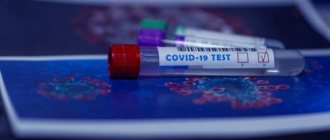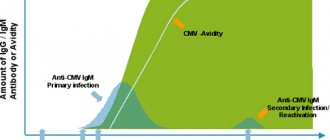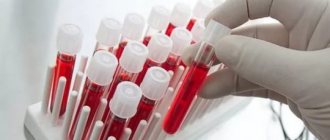The thyroid gland is the most important organ of internal secretion, controlling almost all processes. It produces several vital hormones that ensure the normal functioning of the entire body. According to official statistics from the World Health Organization, about 3% of the population suffers from thyroid diseases. This is due to various reasons: concomitant pathologies, genetic predisposition, living in an iodine-deficient area, etc. Therefore, it is important to periodically check thyroid-stimulating hormone, as this will help to promptly identify deviations in the hormonal balance and begin effective drug treatment.
Why is TSH analysis necessary?
The TSH level is an important diagnostic indicator that allows us to judge the functioning of the thyroid gland. This hormone is secreted by the pituitary gland and affects the production of T3 and T4 (they play an important role in growth, intellectual and physical development, energy reserves, fat and protein metabolism). TSH is responsible for regulating the processes of iodine delivery to the thyroid gland and enhancing lipolysis. T3 and T4 have a significant impact on the functioning of the internal systems of the body. In addition to metabolic processes, they control cardiovascular activity, digestion, reproductive function and even mental health. TSH, T3 and T4 are closely related to each other, so in medical practice they are studied simultaneously. The concentration of the latter hormones is inversely proportional to the TSH content: as soon as a sufficient amount of T3 and T4 appears in the body, the release of TSH stops and vice versa.
Testing for the hormone TSH is most often prescribed for:
- Hypothyroidism and goiter.
- Infertility and other disorders of the reproductive system.
- Undergoing hormone replacement therapy.
- Impaired cardiovascular activity.
- Myopathy.
- Menstrual disorder.
- Psychological disorders.
- Delayed sexual and intellectual development in childhood.
Impaired TSH synthesis can occur for several reasons, including:
- Traumatic brain injuries, large blood loss, damage to the hypothalamic-pituitary system (neoplasms, hemorrhages).
- Pituitary tumors (both benign and malignant), which increase the synthesis of hormones. As a result, active and uncontrolled hormonal production occurs, leading to hypothyroidism, diabetes, infertility, etc.
- Damage to other endocrine glands, including neoplasms or adrenal insufficiency.
- Insufficiency of the hypothalamic-pituitary system. It may occur against the background of infection (meningitis), poisoning with toxic substances, autoimmune pathologies or brain surgery.
- Hemorrhagic stroke (in this case, endocrine disorders fade into the background, since cerebral symptoms predominate).
- The concentration of TSH in women may change due to complications during childbirth or abortion during pregnancy (described in more detail below). Therefore, TSH during pregnancy is always performed in the 1st trimester.
Questions for the doctor
Elevated TSH in tests
Recently, in company with my mother (she has a goiter), I decided to get tested for my thyroid gland. I received the results: TSH – 8.2 mU/l, T3 and T4 are normal. What kind of analysis is TSH? What could his increase mean? Do I need to treat the thyroid gland, provided that I have no special complaints?
Hello! TSH is a pituitary hormone that can be called the main regulator of thyroid function. An increase in its concentration can have a lot of reasons, but with normal T3 and T4 levels, it most likely indicates subclinical hypothyroidism.
I advise you to additionally undergo an ultrasound of the thyroid gland and contact an endocrinologist to decide on the need for hormone replacement therapy.
Changes in thyrotropin in tests
Hello! I examined my thyroid gland for the first time after a miscarriage at 10 weeks. Then they diagnosed “autoimmune thyroiditis” (there were signs of inflammation on ultrasound + TSH – 9 mU/l) and prescribed Eutirox 50 mcg. Recently I was examined - TSH - 0.024. The doctor said that this was not enough and immediately stopped the hormones. I repeat the examination after 2 months, TSH is even lower – 0.009. What could this be connected with, since I don’t take hormones?
Hello! To answer this question, you need to undergo additional examination (ultrasound, AT to rTSH and AT and TPO, St. T4). It is imperative to find out the cause of the developed thyrotoxicosis and, if necessary, begin treatment with thyreostatics.
Laboratory diagnosis of hypothyroidism
Valentina, 46 years old: Hello! I recently took hormone tests, TSH was 18.2 µIU/ml, T4 7.3 pmol/l. A doctor I know said that the first one is just off the charts. What are the normal TSH levels in my case? So what should I do next?
Hello! The reference values of thyrotropin for your age are 0.3-4.0 µIU/ml, T4 st. – 10-22 pmol/l. Indeed, the level of thyrotropin is significantly higher than normal: such a laboratory picture indicates insufficient functional activity of the thyroid gland, or hypothyroidism.
First of all, you need to do an ultrasound of the thyroid gland and contact an endocrinologist who can draw up a further plan for examination and therapy.
Planning pregnancy with low TSH
Ekaterina, 33 years old: I have this situation. My husband and I are planning our first pregnancy (we are no longer young), but I have problems with the thyroid gland. TSH – 0.01. The doctor prescribed Tyrozol, but it needs to be treated for at least a year. We really want a baby, can I get pregnant without taking pills?
Hello! Pregnancy against the background of thyrotoxicosis, which, judging by your TSH level, you have, is a dangerous undertaking. Of course, conception can occur, but gross hormonal imbalances are highly likely to provoke miscarriage, premature birth and other serious consequences. Therefore, before planning a pregnancy, be sure to complete the full course of treatment and make sure that your TSH and T4 levels are normal.
TSH and pregnancy
Evgeniya, 28 years old: Hello. Two years ago I was diagnosed with hypothyroidism, I am seeing an endocrinologist, I take L-thyroxine at a dosage of 50 mcg per day. Now my husband and I are actively planning a pregnancy, I am undergoing a preventive examination. According to the results of tests for hormones, TSH is at the upper limit of normal, T3 and T4 are normal. The doctor insists on increasing the dose of hormones to 75 mg/day, linking this with the upcoming pregnancy. Is this justified?
Hello, Evgeniya! To answer your question in detail, you need to know many nuances, from the history of your disease to the dynamics of laboratory tests over the past months. But in general, I agree with your doctor: without increasing the dosage of L-thyroxine in the early stages of pregnancy, you may develop subclinical and then manifest hypothyroidism.
In this case, correction of hormone therapy is a preventive measure to preserve your health and normal gestation.
Preparation for the procedure
It is extremely important to know how to take a TSH test , since taking preparatory measures will allow you to obtain the most reliable data. Preparation includes:
- 3 days before blood sampling, you need to give up alcoholic beverages, smoking, playing sports, and refrain from stress and temperature changes.
- Stop drug therapy (if possible and approved by your doctor).
- Before the procedure, do not have breakfast, maximum - a glass of still water. It is recommended to refrain from eating any food 12 hours before the test.
How the research is carried out
Taking a TSH test is a universal procedure that does not require special medical instruments or equipment. It is carried out in all clinical laboratories (both paid and public). It is recommended to donate blood in the morning (from 8 to 11 am). The TSH concentration is determined using a chemiluminescent immunoassay on microparticles, which has a high level of accuracy. For this purpose, blood serum obtained from the patient’s vein is used. The procedure itself does not cause severe pain, but may be accompanied by minor discomfort. As a rule, you can get results within 1-2 business days. It is important to understand that the patient receives exclusively diagnostic data, without interpretation and diagnosis. This is done exclusively by the attending physician. If the TSH test is normal , then WHO recommends conducting the next examination no earlier than in a year. If there are problems with the thyroid gland, the frequency of the procedure should be increased to 2 times a year. You can get a TSH test at the medart clinic.
Research technology
For the study, venous blood with a volume of 5 to 10 ml is used. In the case of monitoring the dynamics of changes in TSH concentration, the collection of biological material should be carried out at the same time of day, since the content of the hormone in the peripheral blood is subject to daily fluctuations.
Technique for collecting venous blood for TSH testing
Over the entire history of analysis, 3 generations of analyzers have been developed to determine the concentration of thyrotropin. The 1st generation is almost out of use these days, while the 2nd and 3rd generation are actively used by modern laboratories.
II generation of analyzers
It is based on ELISA (enzyme-linked immunosorbent assay) technology. The analyzers used in this case have a number of advantages:
- Low price.
- Small sizes.
- Available domestic reagents.
- Possibility of use without complex automated laboratory equipment.
But the second generation also has a negative side - the low accuracy of the results obtained (the error reaches 0.5 µIU/ml). At the same time, laboratory owners set the price for such analysis only slightly lower than when using next-generation analyzers.
III generation of analyzers
Here, another technology was taken as a basis - the immunochemiluminescent method. The TSH analysis carried out with its help has an error 500(!) times smaller than that of the 2nd generation - 0.01 µIU/ml. Therefore, it makes sense to apply for thyrotropin testing to laboratories that use third-generation analyzers.
What can affect the results of a TSH test?
The level of the TSH hormone can vary due to the influence of various external or internal factors on the body. This is especially true for the time of day. The maximum concentration is observed at night (from 2 to 4 am and from 6 to 8 am), and the minimum is from 5 to 7 pm. In the absence of proper sleep at night, hormonal synthesis is disrupted. In addition, a decrease in TSH can become a symptom of pregnancy and breastfeeding, which is regarded as a variant of the norm. Some medications may also cause changes in TSH concentrations. The thyroid gland is closely related to other internal organs, so disruption of their functioning significantly affects hormonal production. In middle-aged women and elderly men, the maximum value of thyroid-stimulating hormone is detected in December. During menopause, an increase in TSH is allowed in the absence of signs of an increase in the size of the thyroid gland.
Thyroid-stimulating hormone: normal
Normal TSH directly depends on the person’s age. For each age period, this value has different indicators, which is noticeably visible in the first months after birth. Reference values are:
| Age | TSH level, honey/liter |
| 4 days - half a year | 0,73–4,77 |
| half a year - 14 years | 0,7–4,17 |
| 14–19 years old | 0,47–3,41 |
| Over 19 years old | 0,4–4,0 |
As can be seen from the table, changes in normal TSH levels vary throughout life. Therefore, only a medical professional must make a conclusion based on the results of the analysis, comparing them with the norm. When deciphering, the endocrinologist can also take into account the characteristics of each organism, gender (according to statistics, women develop thyroid problems 2 times more often than men), a history of diseases, medications taken, and much more.
Norm T3 and T4 and interpretation of the analysis
Since the level of triiodothyronine and thyroxine is determined simultaneously with the study of TSH, and they are all interconnected, it is important to know the normal values of these two hormones.
The T3 content in the blood of an adult should be in the range from 1.08 to 3.14 nmol/l. As for thyroxine, the values for men and women are different. For men, the norm is a level from 59 to 135 nmol/l, for women the figure is slightly higher - from 71 to 142 nmol/l.
Deviations from the norm indicate existing pathologies. If T3 is elevated, the reasons may be:
- hyperthyroidism;
- thyroid adenoma;
- Pendrer's syndrome (a genetic disease characterized by vestibular disorders, bilateral hearing loss and goiter);
- chronic liver pathologies;
- choriocarcinoma;
- nephrotic syndrome.
Triiodothyronine is reduced in the following cases:
- iodine deficiency;
- hypothyroidism;
- adrenal insufficiency;
- significant physical activity;
- weight loss.
Deviations from the norm of the T4 hormone are due to the following reasons:
- increase: thyrotoxic adenoma, nephrotic syndrome, decrease in thyroxine-binding globulin;
- A decrease in the hormone is usually associated with diseases of the thyroid gland.
Test results can be indirectly influenced by factors such as severe stress and taking oral contraceptives.
Decoding
An increase in TSH concentration in the blood may indicate:
- Primary hypothyroidism , even in the absence of clinical symptoms. But, as medical practice shows, a detailed questioning of a person often reveals the inability to engage in physical activity for a long time, rapid fatigue, loss of strength, unstable psycho-emotional state, tendency to depression, memory impairment, dry skin, brittle hair.
- Subacute thyroiditis is an inflammation of the thyroid gland. With this disease, organ tissue is damaged due to infection of the upper respiratory tract. The patient experiences pain in the thyroid gland and an increase in its size, myalgia and the inability to engage in physical activity for a long time.
- The presence of a tumor that promotes uncontrolled hormone production. Often occurs during an oncological process localized in the thyroid gland, lungs and mammary gland, as well as with pituitary adenoma.
- Resistance to thyroid hormones.
- Therapy with certain groups of medications , which as a side effect can increase the production of TSH.
A decrease in normal TSH values may occur due to:
- Damage to the thyroid gland.
- Itsenko-Cushing syndrome (develops when the adrenal glands are damaged, as a result of which the synthesis of cortisol increases and the TSH value decreases).
- Severe traumatic brain injuries.
- Hemorrhagic stroke in the pituitary gland or hypothalamus.
What does an elevated TSH mean?
If the indicators obtained as a result of a blood test for TSH
, exceed the norm, this may indicate that the patient has serious illnesses. The concentration of thyroid-stimulating hormone may increase in the following cases:
- pituitary tumor (for example, basophilic adenoma, thyrotropinoma);
- primary, secondary hypothyroidism;
- syndrome of unregulated secretion of the hormone TSH;
- Hashimoto's thyroiditis;
- adrenal insufficiency;
- lead poisoning;
- preeclampsia;
- thyrotropin-secreting lung tumors
- mental disorders, diseases.
It must also be remembered that the TSH
in the body may increase in the
test
results if the patient takes the following drugs as part of treatment: rifampicin, diphenin, methimazole, iodides, furosemides, metoclopramide, aminoglutethimide, benserazide, phenothiazine derivatives, morphine, prednisolone, calcitonin, as well as amiodarone, propranolone, valproic acid , metoprolol, motilium, clomiphene, atenolol and phenytoin.
TSH during pregnancy
Human chorionic gonadotropin has a similar molecular structure to thyroid-stimulating hormone, which determines the activation of the thyroid gland. In the 1st trimester, the concentration of thyroid hormones increases, and TSH decreases. Subsequently, thyrotropin levels return to normal. Therefore, the TSH norm strongly depends on the trimester and should be determined exclusively by the attending physician.
| Term | TSH level, honey/liter |
| First trimester | 0,15 — 2,45 |
| Second trimester | 0,18 — 3,2 |
| Third trimester | 0,29 — 3,5 |
A slight deviation from normal values (no more than 5 mU/liter) may develop as a consequence of psycho-emotional stress experienced by a pregnant woman. A persistently elevated TSH concentration during pregnancy may be a sign of the following conditions:
- Inflammation in the thyroid gland.
- Severe gestosis.
- Neoplasms in the organs of the endocrine system.
- Pituitary adenoma.
- Hypothyroidism.
- Adrenal insufficiency.
- Serious diseases of internal organs, etc.
If a low TSH level during pregnancy is detected in the 1st trimester, then the woman need not worry. This change may be caused by the appearance of signs of toxicosis, often manifested as nausea and vomiting. Normal hormonal levels appear only in the second trimester, when symptoms of toxicosis subside.
The danger is a decrease in thyroid-stimulating hormone due to damage to the endocrine system. Therefore, it is extremely important to regularly monitor hormonal levels and, if even small deviations are detected, seek medical help. Lack of timely medical intervention can lead to miscarriage, premature birth, gestosis, fetal hypoxia, and delayed growth and development of the child.
Reasons for low TSH
A decrease in hormone levels is observed:
- with diffuse toxic goiter;
- thyrotoxic adenoma;
- postpartum necrosis of the pituitary gland;
- latent thyrotoxicosis;
- pituitary injuries;
- nervous breakdown or starvation due to diet;
- attempts to independently regulate the amount of T4 and the subsequent development of thyrotoxicosis.
A drop in TSH levels can be observed in pregnant women with hypothyroidism.
Changes in the direction of decreasing hormone levels occur when using certain medications. The list includes anabolic steroids, glucocorticosteroids, cytostatics, antihypertensive medications and other drugs.









